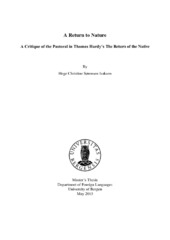A Return to Nature - A Critique of the Pastoral in Thomas Hardy's The Return of the Native
Master thesis
Permanent lenke
https://hdl.handle.net/1956/9972Utgivelsesdato
2015-05-14Metadata
Vis full innførselSamlinger
Sammendrag
Abstract This thesis is an ecocritical study of how Thomas Hardy's The Return of the Native (1878) works as a critique of the pastoral genre. First of all, the analysis is based on the reading that Return was written well within the framework of the pastoral genre, and that Hardy's critique is hidden within the genre it criticises. My claim is that his critique is directed at the romanticizing of the cultivating farmer exploiting nature for his own benefits, not towards the more commonly criticised failure to recognise the hardships suffered by the hard working farmer. Secondly, the approach this analysis is based on is the strand of ecocriticism called deep ecology as it is understood by the Norwegian philosopher Arne Naess, namely that [t]he flourishing of human and nonhuman life on Earth has intrinsic value", and that the value of non-human life forms is independent of the usefulness these may have for narrow human purposes"(Naess, 1989). Thirdly, I rely on the argument that Hardy's landscape, Egdon Heath, is a character in its own right and that it is given agency to act for and upon both itself and its human counterparts. The relationships between the heath and Hardy's human characters is further analysed in detail, with special attention given to Clym Yeobright, Diggory Venn and Eustacia Vye. Finally, I bring into the discussion some aspects concerning Hardy's own life, changes made in the transitions between the various manuscripts of the novel, and how these changes were the products of censorship by Hardy's publishers. With this in mind, my thesis question is: How does Hardy's construction of the heath, and its power to affect his human characters, work to strengthen and validate an ecocritical reading of Return, leading to the argument that Hardy wrote the novel as critique against the romanticizing elements within the pastoral of the Victorian era? In an age when the countryside was considered a possibility for escape from the ever-growing cities, nature was nonetheless only appreciated for the ways in which it could be exploited to benefit humans. Whereas ecocriticism as a field of study is now still considered to be in its early childhood, Hardy wrote a fictional contribution to the ideas of deep ecology as early as 1878 and promoted a love of nature - for nature's own sake. Denne avhandlingen er en økokritisk studie av hvordan Thomas Hardys verk The Return of the Native (1878) fungerer som en kritikk av den pastorale sjangeren. Analysen baserer seg på en tolkning der Return er skrevet innenfor den pastorale sjangerens rammeverk, og der Hardys kritikk er skjult i selve sjangeren den kritiserer. Min påstand er at denne kritikken retter seg mot romantiseringen av den kultiverende bonden, som utnytter naturen til sin egen fordel, heller enn mot den oftere kritiserte mangelfulle evnen til å erkjenne den hardtarbeidende bondens evinnelige slit. Tilnærmingen til analysen baserer seg på en retning innenfor økokritikken kalt dypøkologi (deep ecology), slik den ble introdusert av Arne Næss. Næss vektlegger spesielt at "[t]he flourishing of human and non-human life on Earth has intrinsic value", og "that the value of non-human life forms is independent of the usefulness these may have for narrow human purposes" (Naess, 1989). Som et annet element i analysen tar jeg utgangspunkt i at Hardys landskap Egdon Heath er en egen karakter og aktør, som gis aktørrettigheter til å handle for både seg selv og på vegne av sine menneskelige motstykker. Forholdene og sammenhengen mellom landskapet og Hardys menneskelige karakterer er videre analysert i detalj, der karakterene Clym Yeobright, Diggory Venn og Eustacia Vye vies ekstra oppmerksomhet. Til slutt ser jeg på enkelte aspekter av forfatteren Hardys eget liv. Her drøfter jeg også endringer i overgangene mellom de ulike manuskriptene av romanen og hvordan disse endringene var produkter av sensur fra Hardys utgivere. Med dette som bakteppe, er problemstillingen i avhandlingen som følger: Hvordan fungerer Hardys konstruksjon av landskapet, og dets makt til å påvirke hans menneskelige karakterer, til å styrke og validere en økokritisk lesing av Return? Hvorfor kan man argumentere for at Hardy skrev romanen som kritikk mot de romantiserte elementene i den pastorale diktingen i viktoriatiden? I en tid da landsbyen og den omliggende naturen ble betraktet som en fluktmulighet fra de stadig voksende byene, ble naturen likevel bare verdsatt for måtene den kunne utnyttes til fordel for mennesker. Mens økokritikk som fagområde i dag fremdeles vurderes til å være i sin tidlige barndom, skrev Hardy et fiktivt bidrag til idégrunnlaget i dypøkologi så tidlig som i 1878, og fremmet med det en kjærlighet til naturen - for naturens egen skyld.
